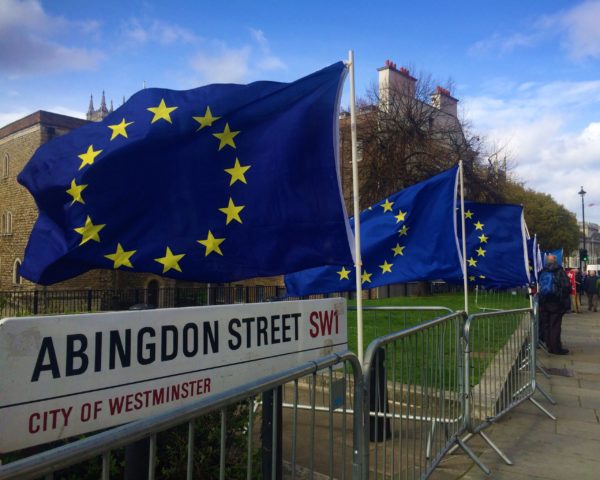
Brexit 10 Years On. What future for the EU and the UK?
It seems fair to say that the new decade did not begin at its best. The finalisation of Brexit took place on 31st January 2020 and was shortly followed by the worldwide outbreak of Covid-19. Considering the complexity of global politics, ten years are likely to be gone in the blink of an eye: long-term changes do not usually happen in such a short time. But then, again: in the space of four years the United Kingdom cancelled forty-seven years of European membership, so who is to say?
The European Union’s delegation in London stated that: “The global health emergency triggered by Covid-19 has shown us that the challenges which we face are global and know no borders”. For this reason, we have tried to imagine what could happen after Brexit. What will be the relationship between the UK and the EU in ten years? We have asked this question to political experts, representatives of institutions, British citizens and residents. In order to answer this question it is necessary to make some considerations on the future of the EU as we know it.
Although no one has the power to predict the future, looking at the past may help. The UK’s decision to leave the EU did not come out of nowhere and can be linked to the fact that British Europeanism never really took off. To start, the rhetoric of British exceptionalism is deeply rooted in British culture. Every identity conceives of itself as opposed to someone else and Britons have usually found their counterparts in Europeans.
Secondly, the United States has always been an attractive pole for the UK. The ‘special relationship’ has made the English Channel seem metaphorically wider than the Atlantic Ocean, and it is well known that president Donald Trump has endorsed Brexit. “People have very much taken for granted many of the everyday benefits of being a member state” told us Chris, a British native citizen with a keen interest in the politics of his country, “[even though] the EU has been responsible for crippling [some member] countries’ economies”. According to these premises, the UK’s departure could have been foreseen.

Historian and former professor of History of the European Integration at the University of Milan Lucio Valent offered his views on some of the likely scenarios for the next decade. “The feeling of belonging to the EU still differs from member to member and the process of the EU losing its appeal started way before the Coronavirus outbreak” he stated. As a historian, it is his job to look at the past, rather than at the future. However, his knowledge of past events may provide a sort of reading key for the future. “Since the financial crisis of 2008, public opinion has progressively shown a preference for national sovereignty over European authority, to the point of questioning the benefits of European membership” he said. “But this is not something new” – Professor Valent added, “the same happened in 1929 when the economic crash was followed by the closure of national borders and the implementation of autocratic policies”.
“How the UK will shape its relationship with the EU depends on its internal growth” Valent said. This is because the performance of the economy always has a political impact. “The one-of-a-kind European market cannot be easily replaced. For this reason, the UK is striving to maintain a close economic relationship with the EU”. According to Professor Valent: “Economic consequences that may occur after the transition period could trigger a new wave of Europeanism in the UK”. This is what Chris hopes too. “By 2030 in one way or another we will have ended up drawing the conclusion that it is better to be part of the EU” he maintains. Like Chris, Professor Valent is optimistic about the role that many years of communality with European countries will play in future policy-making in Britain. The EU delegation in the UK does not exclude the possibility of future co-operation: “We hope that on the basis of shared history, shared values and geographical proximity, there is scope for the EU and the UK to work together on the global stage” the delegation stated. However, as Professor Valent pointed out: “if both the common market and the monetary union still exist in ten years, the international weight of the UK could be questioned”. This is a scenario which would scare hard-line Brexiteers too.
Another aspect to take into consideration is that the departure from Europe could trigger not only a new wave of Europeanism, but some internal discontent too. In this regard, Professor Valent reminds us that in recent years a number of European nations have seen regional demands for independence gain momentum, along with the hope of support from the EU in turn. For example, “those who supported the Belgian secession or Catalonia’s separation from Spain aimed to obtain EU protection”. In the same way, “it is possible that Scottish pride will prevail over British identity due to Brexit”, Valent explained. Fidelity to national identity is hard to change. In fact, more than three-hundred years of being part of Great Britain has not tarnished Scottish pride. “The idea of Scotland leaving the UK is supported by a portion of the Scottish public opinion”. “However,” – Valent added “– such a scenario would only prevail if independence was to be followed by European membership, with its large, regulated and rich market”.

The same applies for Northern Ireland. Here, “the geographic borders and the close relationship with the Republic of Ireland polarise the public debate even more” Valent said. Managing the complex relationship between Northern Ireland and the Republic of Ireland has been a focal point of Brexit negotiations. The Good Friday Agreement of 1998, together with EU regulations, have framed this relationship for many years, and “without the EU, the Good Friday Agreement would inevitably be put under pressure”. If a crisis between England and Scotland occurs, Northern Ireland could also decide to take its own path. According to Chris, the combination of these dynamics and the seemingly unending austerity imposed by the current financial policies and the socio-economic shape the UK is in, will lead to a change in the next general election. “At that point, my hope is that [the government] will seek to reverse the trend” Chris said.
Besides economic and financial implications, the human aspect is what interests Gianna, an Italian who has resided in London for several years. “What has worried me about Brexit is the problem of immigration” – said Gianna – “I have never been a fan of immigration policies; I struggle to understand why we need borders at all”. She studied philosophy and ethics, and is currently employed by a non-profit organisation working with Italian migrants in the UK. If the British government does not ask for an extension of the transition period before 30th June, “freedom of movement from the EU to the UK will become limited, and those who wish to enter the UK will have to meet certain criteria from 1st January 2021” she added. In Gianna’s words “Brexit represents the first step towards an era of national sovereignty and inward focus”. All this is simply against what the EU represents, “togetherness, communication, freedom of movement, mutual support” she said. Even acknowledging the problems that need to be fixed within such a multilateral body, the EU still embodies “the post-war attitude of choosing openness”. “What worries me more than what the relationship between the EU and the UK will be, actually is: Will there still be a EU?” Gianna said. And that is what worries pro-Europeans all.
Cover Photo by Agnese Stracquadanio, 2020, All Rights Reserved
brexit, EU, Europe, Identity, Northern Ireland, Politics, referendum, Scotland, UK, Union, united kingdom